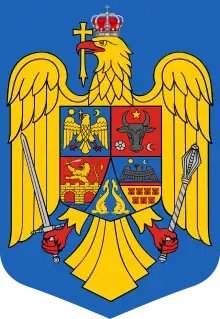Social Democratic Party (Romania)
The Social Democratic Party (Romanian: Partidul Social Democrat, PSD) is the major social-democratic[25] political party in Romania[26][27][28] founded[26][27][28] by Ion Iliescu, Romania's first democratically elected president. The largest party in Parliament with initially 63 seats in the Senate and 158 seats in the Chamber of Deputies, it also has the largest number of mayors, local and county councilors and county presidents thus being the biggest and most influential political force in the country.
PSD traces its origins to the Democratic National Salvation Front, a breakaway group established in 1992 from the post-communist National Salvation Front. In 1993 this merged with three other parties to become the Party of Social Democracy in Romania (PDSR). The present name was adopted after a merger with the smaller Romanian Social Democratic Party (PSDR) in 2001. Since its formation, it has always been one of the two dominant parties of the country. The PDSR governed Romania from 1992 to 1996, while the PSDR was a junior coalition partner between 1996 and 2000. The merged PSD was the senior party in the coalitions governing from 2000 to 2004, and from March 2014 to November 2015, as well as one of the main coalition partners between December 2008 and October 2009 (with the Democratic Liberal Party) and again between May 2012 and March 2014 (as part of the Social Liberal Union).
The party left government after Prime Minister Victor Ponta resigned in November 2015, only to return as the senior governing party in January 2017, after a major victory in the legislative elections. The founder of the party, Ion Iliescu, became President of the Republic, in office from the end of Communism in 1989 to 1996, and again from 2000 to 2004.
History
On 7 April 1992, the struggle for power inside the National Salvation Front (Romanian: Frontul Salvării Naționale, FSN) between the more hard-line group led by Ion Iliescu and the more reformist group led by Petre Roman resulted in the Iliescu group withdrawing from FSN and the founding of the Democratic National Salvation Front (Romanian: Frontul Democrat al Salvării Naționale, FDSN), which would later become the present-day PSD.
FDSN won the 1992 elections and went on to govern Romania until 1996. On 10 July 1993 it took the name of Party of Social Democracy in Romania (Romanian: Partidul Democrației Sociale in România, PDSR) upon merger with the Socialist Democratic Party of Romania, the Republican Party and the Cooperative Party.
From 1994 to 1996 the PDSR ruled in coalition with the right-wing Romanian National Unity Party (PUNR) and Greater Romania Party (PRM), and the left-wing Socialist Party of Labour. PUNR had ministers in the cabinet chaired by Nicolae Văcăroiu from March 1994 to September 1996. PRM was not present at the Cabinet, but was given some posts in the State administration. The PDSR went into opposition after the 1996 election, which was won by the right-wing coalition Romanian Democratic Convention (CDR).
After 4 years of governmental turmoil and economic downfall, poorly managed by the crumbling CDR, saw PDSR making a fulminant comeback, winning the November 2000 elections, this time in a coalition named the Social Democratic Pole of Romania along with the Romanian Social Democratic Party (PSDR) and the Romanian Humanist Party (PUR). PSDR merged with PDSR on 16 June 2001, and the resulting party took its present name, PSD.
In November 2004, Adrian Năstase, the PSD candidate and incumbent Prime Minister, won the first round of the presidential elections but did not have a majority and had to go to a second round of voting, which he narrowly lost to Traian Băsescu of the opposition Justice and Truth alliance, who became Romania's 4th president. In the legislative elections of 2004, the PSD gained the largest share of the vote but because it did not have a majority, the other parties that managed to enter parliament, UDMR and PUR, abandoned their respective pre-electoral agreements with PSD and joined the Justice and Truth Alliance, mainly at the pressure of the recently elected president.
Mircea Geoană was elected president of the party in April 2005 by delegates at a PSD Party Congress held in Bucharest. His victory represented a surprise defeat for former President Ion Iliescu, who was expected to defeat Geoană handily.
On 17 April 2008, the Social Democratic Party and the Conservative Party announced they would form a political alliance for the 2008 local elections.[29]
In February 2010, the Congress elected Victor Ponta as president, after Mircea Geoana lost the presidential elections in December 2009.
On 5 February 2011, the PSD formed a political alliance known as the Social Liberal Union (USL) with the Conservative Party and National Liberal Party.[30] The USL was disbanded on 25 February 2014 with exit of the National Liberal Party which immediately entered opposition.[31]
In July 2015, Liviu Dragnea was elected by the Congress of the PSD as the new president of the party, with 97% of the votes from the members. He was elected as leader after the former Prime Minister of Romania Victor Ponta stepped down on 12 July 2015, following charges of corruption that were later dropped.
On 12 April 2019 PSD was suspended from the Party of European Socialists following concerns about judicial reforms of the incumbent PSD government.[32]
After Liviu Dragnea's jailing, in May 2019, Viorica Dăncilă was elected by the Congress of the PSD as the new president of the party.
Ideology
According to Florin Poenaru, "the movement led by Ion Iliescu was from the very beginning the party of local capitalists and not of the industrial proletariat [...] PSD was the party that aggregated the interests of the autochthonous capitalists, but whose electoral basis was the former industrial proletariat."[33] Poenaru states that PSD never said no to the neoliberal agenda, but applied it rather slowly.[33] Andrei Pleșu once stated that the main post-Communist Romanian parties do not act according to some ideology or doctrine.[34]
The party has been described as having left-leaning rhetoric and economic policies, while being conservative on personal and ethical matters.
Structure
President
The president of the party conducts the general activity of the party, the activity of the National Executive Committee and the National Permanent Bureau and responds to the Congress on the general work of the Social Democratic Party. The president is elected by secret vote by the Congress for a four-year mandate and represents the party in the Romanian society, in relations with the central and local public authorities, as well as with other parties or organizations in the country or abroad.
Honorary President
PSD Honorary President is nominated by Congress for the four-year mandate of the party's recognized personalities. The Honorary President of the PSD participates with the right to vote in the work of the national governing bodies.
Secretary General
The Secretary-General manages the functional services at the central level and the relationship with the county and Bucharest organizations. It coordinates the Executive Secretariat of the PSD with 7 to 9 executive secretaries. Executive secretaries shall be appointed by the National Executive Committee, on a proposal from the Chair, after consulting the Secretary-General.
Permanent National Bureau
The Permanent National Bureau is the operative body for analyzing and deciding the party. It has the following composition: PSD President, PSD Honorary President, PSD Secretary General, PSD Deputy Chairpersons. At the National Permanent Bureau, the chairman of the National Council, the leaders of the parliamentary groups, the presidents of women and youth organizations, the treasurer, the director of the Social Democratic Institute, the representative of the county administrative council presidents, the mayors of municipalities and the representative of the National League of Mayors and PSD Councilors participate. The National Permanent Bureau meets weekly, usually Monday.
The Permanent National Bureau shall have the following duties:
- To organize and direct the entire current activity of the Party, according to the decisions adopted as appropriate by the Congress, the National Council and the National Executive Committee;
- Drafts draft decisions that it submits to the debate and adoption of the National Executive Committee;
- Orientates the work of parliamentary groups;
- Establishes and coordinates working committees on doctrine, electoral programs and strategies;
- Establishes and co-ordinates political analysis groups of the economic, social, domestic and international situation;
- Manages the party's patrimony.
The National Executive Committee
Coordinates the entire activity of the party between the meetings of the National Council. The PSD National Executive Committee analyzes, debates and decides on the fundamental issues of the Party's work on: the program, the electoral strategy, the political and electoral alliances, the governing program, the structure and the nominal composition of the Government, the validation of the party's preliminary election for the nomination of candidates for senators, MEPs, MEPs and elected local, merging by absorption or merging with other parties; PSD collaboration agreements with trade unions and employers' confederations; the strategy of selecting, preparing, training and promoting the party's human resources, organizing and conducting internal party choices, coordinating the activities of the Youth Organization and the Women's Organization. The adopted decisions are validated by the National Council. The National Executive Committee consists of PSD President, PSD Honorary President, PSD Secretary General, PSD Vice Presidents, President of the National Council, Presidents of County Organizations, Sectors and the Bucharest Municipality Organization, the President of the Women's Organization and the President of the Youth Organization.
National Council
.jpg.webp)
The National Council is the governing body of the party in the interval between two congresses. It consists of a maximum of 751 members elected from the candidates nominated by the County and Bucharest Conferences, or proposed by the Congress. The National Council elects and revokes by secret vote the President of the National Council and the treasurer, validates the composition of the National Executive Committee and The Permanent National Bureau; decides to conclude political alliances as well as merge by merging or absorbing with other political parties or political parties; to hear the activity reports submitted by members of the Permanent National Bureau, by the Chairman of the Commission for Arbitration and Moral Integrity, by the President of the National Commission for Financial Control and Treasurer and decides accordingly on the basis of the mandate given by the Congress, according to the provisions of the Statute; is responsible for organizing presidential, parliamentary, euro-parliamentary and local electoral campaigns; analyzes the work of parliamentary groups, women's and youth organizations, the National League of Mayors and PSD Councilors; validates the decisions of the National Executive Committee on the Governance Program and confirms the proposals of members of the Government; resolve the appeals lodged against the decisions of the councils of the county organizations or of the Bucharest municipality; resolves the divergences between the Councils of the County Organizations, respectively the Bucharest Municipality Organization and the National Executive Committee in connection with the nomination of the candidates for the legislative elections, if they persist; approves the party's annual revenue and expenditure budget, decides on its execution. The PSD National Council meets annually and whenever needed. Deputies, senators and MEPs who are not members of the National Council participate in its meetings without the right to vote. The National Council may decide, on a proposal from the Permanent National Bureau, to organize forums, leagues, associations, clubs and other such bodies for the promotion of strategies in the PSD Political Program, in the Romanian society and in partnership with the trade unions. The party-union relationship as well as the concrete ways of collaboration will be established by the National Permanent Bureau. Within the PSD there are: the National Workers' Forum; National Farmers Forum; National Ecologists' Forum; The National Forum of Scientists, Culture and Art and the Pensioners' League. In order to develop PSD programs and strategies in the field of party life, consultative councils can be set up on: political analysis, image and relations with the media; organization and human resources. The Consultative Council for the Problems of National Minorities of the PSD carries out activities to identify the specific problems faced by national minorities in Romania and develops appropriate solutions and proposals for their resolution.
Congress
The supreme governing party of the Social Democratic Party is the Congress, which is convened every four years or in extraordinary cases. The PSD Congress is made up of elected delegates by secret ballot by the County Conferences and the Bucharest Municipality and has the following attributions: adopting or modifying the PSD Statute and the Political Program of the Party; sets out the party's guidelines, strategy and tactics for the period between two congresses; elects the party chairman, the vice-presidents, the general secretary, the other members of the National Council, the National Commission for Arbitration and Moral Integrity and the National Commission for Financial Control; appoints the PSD candidate to the position of President of Romania and the Prime Minister in the event of winning the elections; resolves possible appeals against decisions of other PSD central bodies.
Leadership of FDSN, PDSR, and PSD
Presidents:
- Ion Iliescu January 1990–June 1990 (FSN)
- Petre Roman June 1990 – 1992 (FSN)
- Oliviu Gherman 1992–1996; (FDSN/PDSR)
- Ion Iliescu 1997–2000; (PDSR)
- Adrian Năstase 2000–2005 (acting to 2001); (PDSR/PSD)
- Mircea Geoană 2005–2010; (PSD)
- Victor Ponta 2010–2015; (PSD)
- Rovana Plumb 2015 (acting); (PSD)
- Liviu Dragnea 2015–2019; (PSD)
- Viorica Dăncilă 2019; (PSD)
- Marcel Ciolacu 2019–present (acting to 2020) (PSD)
Executive presidents
- Adrian Năstase 1993–1997
- position abolished 1997–2003
- Octav Cozmâncă 2003–2005
- Adrian Năstase 2005–2006
- Dan Mircea Popescu 2005–2006, when the office was dissolved (nominated Ad interim after the resignation of Adrian Năstase from the office)
- position abolished 2006–2013
- Liviu Dragnea 2013–2015
- Valeriu Zgonea 2015–2016
- Niculae Bădălău 2016–2018
- Viorica Dăncilă 2018–2019
- Paul Stănescu 2019 (acting)
- Eugen Teodorovici 2019
- position abolished 2019–present
.jpg.webp) Ion Iliescu
Ion Iliescu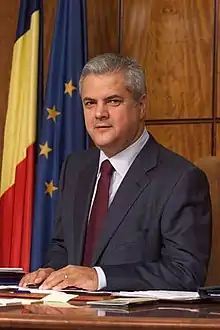 Adrian Năstase
Adrian Năstase.jpg.webp) Mircea Geoană
Mircea Geoană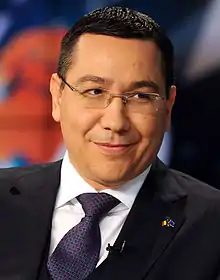 Victor Ponta
Victor Ponta_(14465750525).jpg.webp) Liviu Dragnea
Liviu Dragnea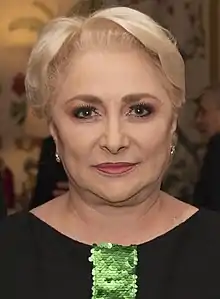 Viorica Dăncilă
Viorica Dăncilă
Notable members
Current members
- Ecaterina Andronescu, former Minister of Education
- Titus Corlățean, Minister of Foreign Affairs, Minister of Justice
- Ion Iliescu, former President of Romania, Honorary President of PSD
- Rovana Plumb, MEP, Minister of Environment, Minister of Labour
- Viorica Dăncilă, former Prime Minister of Romania
- Mihai Tudose, former Prime Minister of Romania
- Sorin Grindeanu, former Prime Minister of Romania
- Lia Olguța Vasilescu, Mayor of Craiova, Minister of Labour
Former members
- Robert Negoiță, former Mayor of the 3rd Sector of Bucharest
- Mircea Geoană, former President of the Senate, Minister of Foreign Affairs
- Sorin Oprescu, former Mayor of Bucharest
- Marian Vanghelie, former Mayor of the 5th Sector of Bucharest
- Radu Mazăre, former Mayor of Constanța
- Victor Ponta, former Prime Minister of Romania
- Adrian Năstase, former Prime Minister of Romania, Minister of Foreign Affairs
Electoral history
Legislative elections
| Election | Chamber | Senate | Position | Aftermath | ||||
|---|---|---|---|---|---|---|---|---|
| Votes | % | Seats | Votes | % | Seats | |||
| 1992 | 3,015,708 | 27.72 | 117 / 341 |
3,102,201 | 28.29 | 49 / 143 |
1st (as FDSN) |
PDSR-PUNR-PRM government (with PSM support) |
| 1996 | 2,633,860 | 21.52 | 91 / 343 |
2,836,011 | 23.08 | 41 / 143 |
2nd (as PDSR) |
Opposition to CDR-USD-UDMR government |
| 2000 | 3,968,464 | 36.61 | 139 / 345 |
4,040,212 | 37.09 | 59 / 140 |
1st (within PDSR)1 |
PDSR minority government (with UDMR support) |
| 2004 | 3,730,352 | 36.61 | 113 / 332 |
3,798,607 | 36.30 | 46 / 137 |
1st (within PSD+PUR)2 |
Opposition to DA-PUR3-UDMR government (until April 2007) |
| Supporting PNL-UDMR minority government | ||||||||
| 2008 | 2,279,449 | 33.10 | 110 / 334 |
2,352,968 | 34.16 | 48 / 137 |
2nd (within PSD+PC)4 |
PDL-PSD government (until December 2009) |
| Opposition to PDL-UNPR-UDMR government (until May 2012) | ||||||||
| USL government (until December 2012) | ||||||||
| 2012 | 4,344,288 | 58.63 | 149 / 412 |
4,457,526 | 60.10 | 58 / 176 |
1st (within USL)5 |
USL government (until March 2014) |
| PSD-UNPR-UDMR-PC government (until December 2014) | ||||||||
| PSD-UNPR-ALDE government (until November 2015) | ||||||||
| Supporting the technocratic Cioloș Cabinet (2015–2017) | ||||||||
| 2016 | 3,204,864 | 45.48 | 154 / 329 |
3,221,786 | 45.68 | 67 / 136 |
1st | PSD-ALDE government (2017–2019) |
| PSD minority government (2019) | ||||||||
| Supporting PNL minority government (2019–2020) | ||||||||
| Opposition to PNL minority government (2020) | ||||||||
| 2020 | 1,705,777 | 28.90 | 110 / 330 |
1,732,276 | 29.32 | 47 / 136 |
1st | Opposition to PNL-USR-PLUS-UDMR government (2020–present) |
Notes:
1 Social Democratic Pole of Romania members: PDSR, PSDR (2 senators and 10 deputies) and PUR (4 senators and 6 deputies).
2 National Union PSD+PUR members: PSD and PUR (11 senators and 19 deputies).
3 Soon after the elections, PUR broke the alliance and switched sides, joining Justice and Truth Alliance.
4 Alliance PSD+PC members: PSD and PC (1 senator and 4 deputies).
5 Social Liberal Union was an alliance of two smaller alliances: Centre Left Alliance and Centre Right Alliance. Centre Left Alliance members: PSD and UNPR (5 senators and 10 deputies). Centre Right Alliance members: PNL (51 senators and 101 deputies) and PC (8 senators and 13 deputies).
Presidential elections
| Election | Candidate | First round | Second round | ||||
|---|---|---|---|---|---|---|---|
| Votes | Percentage | Position | Votes | Percentage | Position | ||
| 1990 | Ion Iliescu | 12,232,498 | 85.07% | 1st | |||
| 1992 | Ion Iliescu | 5,633,465 | 47.5% | 1st | 7,393,429 | 61.4% | 1st |
| 1996 | Ion Iliescu | 4,081,093 | 32.3% | 1st | 5,914,579 | 45.6% | 2nd |
| 2000 | Ion Iliescu | 4,076,273 | 36.4% | 1st | 6,696,623 | 66.8% | 1st |
| 2004 | Adrian Năstase | 4,278,864 | 40.9% | 1st | 4,881,520 | 48.8% | 2nd |
| 2009 | Mircea Geoană | 3,027,838 | 31.1% | 2nd | 5,205,760 | 49.7% | 2nd |
| 2014 | Victor Ponta | 3,836,093 | 40.4% | 1st | 5,264,383 | 45.6% | 2nd |
| 2019 | Viorica Dăncilă | 2,051,725 | 22.3% | 2nd | 3,339,922 | 33.91% | 2nd |
European elections
| Election | Votes | Percentage | MEPs | Position | EU Party | EP Group |
|---|---|---|---|---|---|---|
| 2007 | 1,184,018 | 23.11% | 10 / 35 |
2nd | PES | S&D |
| 2009 | 1,504,218 | 31.07% | 10 / 33 |
1st (within PSD+PC)1 |
PES | S&D |
| 2014 | 2,093,237 | 37.60% | 12 / 32 |
1st (within USD)2 |
PES | S&D |
| 2019 | 2,040,765 | 22.51% | 8 / 32 |
2nd | PES | S&D |
Notes:
1 Alliance PSD+PC members: PSD and PC (1 MEP).
2 Social Democractic Union (USD) members: PSD, PC (2 MEPs) and UNPR (2 MEPs).
Controversies
Political opponents have criticised PSD for harbouring former Romanian Communist Party officials, and for allegedly attempting to control the Romanian mass media. A number of its current or former senior members have also been accused of corruption, interfering in the judiciary and using their political positions for personal enrichment.[35] Founding member Ion Iliescu is currently facing prosecution on charges of crimes against humanity for his role in the June 1990 Mineriad,[36] while former president Liviu Dragnea was convicted for electoral fraud and for instigation to the abuse of public office and currently being indicted for forming an “organised criminal group”.[37] Former president Victor Ponta had also been investigated for corruption, but was ultimately acquitted.[38]
Alleged text transcripts of PSD meetings surfaced on an anonymous Web site just before the 2004 Romanian presidential election. Năstase and his ministers are shown talking about political involvement in corruption trials of the government's members, or involvement in suppressing "disobedient" media. Năstase stated that the transcripts were fake, but several party members, including former PSD president and former Foreign Minister Mircea Geoană, have said they are indeed genuine. Geoană later retracted his statement.[39]
Adrian Năstase temporarily "self-suspended" himself from the position on 16 January 2006 pending investigation of a scandal provoked by his wealth declaration, where he was accused of corruption.[40]
Politicians of the party have occasionally employed "utilitarian anti-Semitism". This means that politicians who may usually not be anti-Semites played off certain anti-Semitic prejudices, in order to serve their political necessities.[41] PSD Senator Dan Șova, at the time party spokesman, claimed, on 5 March 2012, on the Money Channel that "no Jew suffered on Romanian territory, thanks to marshal Antonescu."[42] Elie Wiesel National Institute for Studying the Holocaust in Romania expressed its deep disagreement and indignation over the statements of the spokesman of the party.[43] Following public outcry, Șova retracted his statement and issued a public apology. Nevertheless, the chairman of the party, Victor Ponta, announced his removal from the office of party spokesman.[44]
Since 2017 the party, together with its coalition members, the Alliance of Liberals and Democrats and the Democratic Alliance of Hungarians in Romania, is trying to pass a series of controversial laws related to the judicial system. In a preliminary opinion, the Venice Commission noted that the changes could undermine the independence of judges and prosecutors.[45] This endeavour by the current coalition is the basis for the 2017–2019 Romanian protests.
See also
References
- Dumitrescu, A. (10 September 2014). "Câți membri au partidele din România" (in Romanian). Stiripesurse.ro. Retrieved 19 June 2015.
- Păun, Carmen (13 December 2016). "Pragmatism is a winner for Romanian Left". POLITICO. Retrieved 16 February 2019.
- Leiße, Olaf; Leiße, Utta-Kristin; Richter, Alexander (2013) [2004]. "3.3 Parteien und politische Entwicklung". Beitrittsbarometer Rumänien. Grundprobleme des Landes und Einstellungen rumänischer Jugendlicher auf dem Weg in die Europäische Union (in German). Wiesbaden: Deutscher UniversitätsVerlag. p. 51. ISBN 978-3322813206.
- Nordsieck, Wolfram (2020). "Parties and Elections in Europe". Parties and Elections in Europe. Archived from the original on 14 February 2018. Retrieved 18 December 2020.
- Melenciuc, Sorin (30 May 2018). "BR Analysis. Money to spend only on wages and pensions? Romania's social spending enters danger zone above 60 pct of total budget, limiting room for response in case of economic downturn". Business Review. Retrieved 17 October 2019.
- "2018 budget: Romania's Govt. plans to increase spending by 12% next year". Romania Insider. 4 December 2017. Retrieved 17 October 2019.
- "Rumänien führt "Steuer gegen Gier" ein". Deutsche Welle. 22 December 2018. Retrieved 18 February 2019.
- Mihăilescu, Daniel (2019). "Rumänien startet EU-Ratsvorsitz mit neuer Attacke gegen Justizsystem". Die Presse. Retrieved 19 February 2019.
- Bossart, Marco Kauffmann (21 February 2018). "Rumäniens Justiz im Belagerungszustand". Neue Zürcher Zeitung (in German). Retrieved 17 October 2019.
- Krökel, Ulrich (10 March 2017). "Aufgefallen: Der stille Anführer". Publik-Forum.de (in German). Retrieved 17 October 2019.
- Beichelt, Timm (2013) [2001]. "6.1.1 Strukturelle Kontextbindungen". Demokratische Konsolidierung im postsozialistischen Europa: Die Rolle der politischen Institutionen (in German). Springer-Verlag. p. 299. ISBN 978-3322813206.
- Ban, Cornel (12 December 2016). "Romania: a social democratic anomaly in eastern Europe?". openDemocracy. Retrieved 17 October 2019.
- Dąborowski, Tomasz (14 December 2016). "The Social Democrats' triumph in Romania". OSW. Retrieved 17 October 2019.
- Gurzu, Anca (13 March 2019). "Romania's rulers take Euroskeptic turn". POLITICO. Retrieved 17 October 2019.
- "Romania". Europe Elects. 17 May 2018. Retrieved 17 October 2019.
- Gilet, Kit (30 December 2018). "Romania, Fighting the E.U., Prepares to Lead It". The New York Times. Retrieved 17 October 2019.
- Gherghina, dr. Sergiu (25 February 2019). "Friends or Foes? Romania and the Council Presidency". Europa Nu. Retrieved 17 October 2019.
- "Val de atacuri ale lui Dragnea la adresa UE: Noi nu am fost coloniști. Problema e că vin peste noi". Digi24 (in Romanian). 12 April 2019. Retrieved 17 October 2019.
- https://www.pes.eu/en/members/parties-map/#214168d5-7e5a-11e6-b095-8cdcd4d4c346/080529e6-8576-11e6-aa40-9a82572148c5
- "Full list of member parties and organisations". Socialist International. Retrieved 22 July 2019.
- "Parties & Organisations". Progressive Alliance. Retrieved 22 July 2019.
- "Grupuri parlamentare Senatul României". www.senat.ro.
- Chamber of Deputies website
- http://www.2016bec.ro/wp-content/uploads/2016/06/SIAL2016_Situatia_mandatelor_partide-2.xlsx
- Almeida, Dimitri (27 April 2012). The Impact of European Integration on Political Parties: Beyond the Permissive Consensus. CRC Press. pp. 71–. ISBN 978-1-136-34039-0. Retrieved 14 July 2013.
- Hogea, Alina. "Coming to Terms with the Communist Past in Romania: An Analysis of the Political and Media Discourse Concerning the Tismăneanu Report". Studies of Transition States and Societies. 2: 16–30.
- Tismăneanu, Vladimir (7 July 2011). "225. Romania's First Post-Communist Decade: From Iliescu to Iliescu". Wilson Center. Retrieved 17 October 2019.
- Radio Free Europe/Radio Liberty (13 October 2008). "Romania Clears Ex-President Of Murder Charges". RadioFreeEurope/RadioLiberty. Retrieved 17 October 2019.
- "Romania's PSD and PC form alliance (SETimes.com)". setimes.com. 17 April 2008. Archived from the original on 7 June 2008. Retrieved 17 October 2019.
- Zhang (6 February 2011). "Romanian Oppositions Form Alliance". CRIENGLISH. Retrieved 17 October 2019.
- Bivol, Alex (25 February 2014). "Romania's Liberals to leave ruling coalition, government". The Sofia Globe. Retrieved 17 October 2019.
- "European Socialists freeze relations with Romanian ruling party". Romania Insider. 12 April 2019. Retrieved 17 October 2019.
- Poenaru, Florin (2017). Locuri comune: clasă, anticomunism, stânga. Editura Tact. ISBN 978-606-8437-84-2. apud Cistelecan, Alex (29 May 2017). "Materialismul evanescent". revistavatra.org (in Romanian). Retrieved 4 December 2018.
- Pleșu, Andrei; Pătrășconiu, Cristian (31 August 2010). "Orice doctrină devine periculoasă când se transformă în ideologie". Revista 22 PLUS (in Romanian) (301). Retrieved 17 October 2019.
- Mihăilescu, Robert (3 December 2009). "Ion Caramitru demisioneaza din conducerea PNTCD: Sefii PSD, fosti nomenclaturisti sau copiii lor, sunt tarati de originea comunista. Nu cred in moartea comunismului prin comunisti". HotNewsRo. Retrieved 10 June 2015.
- "Romania ex-leader in 1990 deaths case". BBC News. 21 October 2015. Retrieved 17 October 2019.
- "Alarming attempts to undermine Romanian democracy - Nobbling the nobblers". The Economist. 8 February 2018. Retrieved 17 October 2019.
- Ilie, Luiza (10 May 2018). "Bucharest court acquits former Romanian PM in graft case". Reuters. Retrieved 17 October 2019.
- Banches, Ovidiu (17 August 2005). "Geoana, stenogramele si reformarea PSD". 9AM. Retrieved 10 June 2015.
- "Adrian Nastase s-a autosuspendat din conducerea PSD". HotNewsRo. 16 January 2006. Retrieved 10 June 2015.
- Shafir, Michael (2004), "Memories, Memorials and Membership: Romanian Utilitarian Anti-Semitism and Marshal Antonescu", Romania Since 1989: Politics, Economics, and Society, Lexington Books, p. 71
- "Romanian MP stirs outcry with Holocaust comment". European Jewish Press. 7 March 2012. Archived from the original on 8 March 2012. Retrieved 7 March 2012.
- "'Elie Wiesel' Institute in Romania criticizes Senator Sova for statements made on a TV channel". actmedia.eu. Retrieved 7 March 2012.
- "Sozi-Chef Ponta enthebt Parteisprecher Sova zeitweilig des Amtes wegen Holocaust-Leugnung" (in German). punkto.ro. Retrieved 7 March 2012.
- "Romania: Proposed reforms could undermine independence of judges and prosecutors according to Venice Commission". coe.int. 13 July 2018. Archived from the original on 19 July 2018. Retrieved 17 October 2019.
External links
| Wikimedia Commons has media related to Social Democratic Party (Romania). |
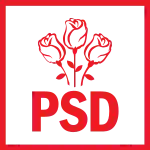
.JPG.webp)
